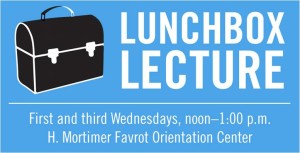New Year and New Lectures
 What does Archery, music, China, and Newcomb College have in common?
What does Archery, music, China, and Newcomb College have in common?
Give up? They are featured topics of Lunchbox Lectures! 2016 is already here and that means a new lineup of Lunchbox Lectures at The National WWII Museum. This year, we have a wild mix of social, local, and military history that is sure to peak your curiosity.
Hear experts and enthusiasts discuss the little known battle code named “Operation Archery” that forced Hitler to divert 30,000 troops away from the European Atlantic Coast. Also learn of the efforts of the United China Relief organization whose mission was to promote sympathy and support for war-torn China within the United States. In April, join Dr. Charles Chamberlain as he explores the era’s jazz, pop, and Latin music that rallied the U.S. home front. While March boasts a presentation of the graduate work of Kay Manuel from the University of Louisiana at Lafayette who explores life in New Orleans for women at Newcomb College. All of these topics and more can be found with the online calendar.
Lunchbox Lectures are casual and fun opportunities to hear the latest on the study of World War II. Lunchbox Lectures are always free and open to the public on every first and third Wednesday of the month at 12:00 p.m. – 1:00 p.m. Feel free to bring your lunch or order from Jeri Nims Soda Shop here at the Museum. For more information please call 504-528-1944 x 463.
What’s Scheduled through April 2016:
January 6, 2016
Winston Ho, Rutgers University
“United China Relief: U.S. Humanitarian Aid to Wartime China.”
United China Relief was founded in February of 1941 by six non-government charitable organizations in the U.S. to raise money for their operations in China. Its original mission was to assist the Chinese nation in its war against the Japanese invasion, and to promote sympathy for China in a neutral United States. After Pearl Harbor, China became America’s fighting ally in the Pacific. While federal lend-lease programs supported the Nationalist Chinese military, UCR supported the Chinese people. United China Relief provided medical supplies, assisted in rebuilding the civilian economy, and supported universities and medical training centers.
January 20, 2016
Dr. Sarah Cramsey, Tulane University
“Most Significant Spot in Europe: How the “Ethnic Revolution” came to Nachod, Czechoslovakia”
Between September 1945 and December 1946, nearly 130,000 Polish citizens of Jewish descent migrated through Czechoslovakia after failed attempts at repatriation to western Poland. Many migrants found financial, social, and humanitarian support from the Czech government, who supported their migration to their ethnic homelands of Palestine. The road to Palestine began for many Polish Jews at Náchod and their benefactors hailed, in part, from Czechoslovakia.
February 3, 2016
Walter Stern, PhD., The National WWII Museum
“World War II and the Civil Rights Movement”
When the fighting was finished, what did World War II mean for African Americans? Did the war give birth to the Civil Rights Movement, or did it stifle and delay black protest? Dr. Walter Stern brings the war’s legacy for African Americans to life through vivid stories of veterans’ experiences in the postwar world.
February 17, 2016
Walt Burgoyne, The National WWII Museum
“Operation Archery”
Operation Archery was a British raid on German occupied Norway on December 27,1941. Assistant Director of Education, Walt Burgoyne, will discuss how British commandos and Norwegian resistance fighters captured a full copy of the German Naval Code book and persuaded Hitler to divert 30,000 troops to Norway away from the European Atlantic coast.
March 2, 2016
Kay Manuel, University of Louisiana at Lafayette
“Perspective on World War II: The Newcomb War Experience”
Women in higher education experienced the war differently from other civilians on the home front. It changed their environment, culture, and the lives of friends and family. Learn how World War II affected students at Newcomb College through the unique perspective of one individual, Coralie Guarino, both during and after the war. Explore how Guarino and her colleagues navigated difficult gender and social barriers because of their positions at Newcomb while still thriving within the successful arts programs.
March 16, 2016
Herman “Dutch” Prager, WWII Veteran of the USS Kingfish
“USS Kingfish: Submariner ‘Dutch’ Prager”
During his service in World War II, Dutch Prager was on four patrols aboard the USS Kingfish in the Pacific Theater of operations. Join us as Prager shares his stories and experiences of being a submariner deep below the ocean surface. This talk is especially important as it is the 70th anniversary of the decommissioning of the USS Kingfish.
April 6, 2016
Charles Chamberlain, PhD, Historia LLC
“Music and WWII: Mobilizing the Masses”
Explore the central role that music played in mobilizing the American public to support the Allied Cause during World War II. Dr. Chamberlain will show a large variety of World War II-era music videos to illustrate how the Office of War Information used jazz, pop, Latin, and country music to rally the home front.
- Posted :
- Post Category :
- Tags :
- Follow responses to this entry through the RSS 2.0 feed. You can skip to the end and leave a response. Pinging is currently not allowed.




Leave a Reply